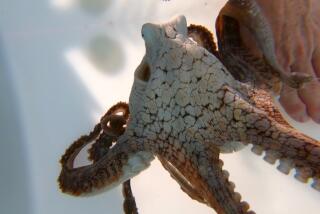Boxer Seeks to Preserve Law on ‘Dolphin-Safe’ Tuna
- Share via
WASHINGTON — Bracing for a battle over “dolphin-safe” tuna, California Sen. Barbara Boxer introduced legislation last week aimed at maintaining strict labeling standards established by law five years ago.
The current labeling of “dolphin-safe” tuna in grocery stores alerts consumers that tuna has been caught with methods that avoid indiscriminate killing of dolphins, but concessions in an international trade agreement now threaten to change those standards.
The changes go too far, said Boxer, a Democrat, and would obstruct the right of U.S. consumers to know about the product they are purchasing.
“ ‘Dolphin-safe’ tuna fishing means that dolphins were not chased or encircled with nets during a tuna fishing trip,” Boxer said during a Capitol Hill press briefing Thursday. “The $1-billion U.S. canned tuna market is a ‘dolphin-safe’ market and consumers know that the ‘dolphin safe’ label means that dolphins were not harassed or killed.”
Legislation that would redefine the labeling standard has been proposed by Sen. Ted Stevens (R-Alaska) to accommodate the Panama Declaration, an agreement among the United States, Mexico and 11 Latin American nations.
His legislation would not only lift the U.S. embargo on imported tuna, it would also allow fishing with purse-seine nets, a fishing technique known to encircle and inadvertently kill dolphins. In addition, the bill would permit tuna caught by this method to be labeled “dolphin-safe.”
Stevens believes such tuna catches will be acceptable because the legislation also stipulates that impartial observers monitor fishing fleets to ensure that there is no “observed mortality” of dolphins.
“No matter what fishing technique is used, it’s the observers who make sure that the catch is safe,” said Stevens’ press secretary Mitch Rose.
The renewed debate over “dolphin-safe” tuna has divided environmental groups over acceptable fishing methods. Some believe Stevens’ bill may help broaden efforts to save dolphin populations.
“An international problem needs an international solution,” said World Wildlife Fund spokesman David Schorr, who said the Panama Declaration would expand and strengthen monitoring efforts necessary to reduce dolphin slaughters.
But Stevens’ bill has alarmed the Sierra Club, which views the legislation as a retreat from the landmark 1990 law Boxer sponsored when she served in the House. “Stevens abandons the goal of zero-dolphin mortality, allowing thousands of animals to be killed every year in perpetuity, endangering the recovery of depleted populations,” said Sierra Club spokeswoman Maxine McCloskey.
Saying that dolphin mortality has dropped from more that 100,000 in 1990 to less than 5,000 in 1994, Boxer questioned the need to overhaul the labeling standard.
“I agree that we should lift the blanket ban on tuna imports and open our markets to foreign fishing vessels who use ‘dolphin-safe’ methods,” she said. “But there is no reason to reward those who persist in traumatizing these animals and say, ‘As long as you don’t see a dead dolphin, you can sell us your tuna and call it “dolphin-safe.” ’ That would be a fraud on consumers.”
More to Read
Sign up for Essential California
The most important California stories and recommendations in your inbox every morning.
You may occasionally receive promotional content from the Los Angeles Times.










